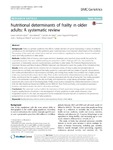Nutritional determinants of frailty in older adults: a systematic review

View/
Use this link to cite
http://hdl.handle.net/2183/18624
Except where otherwise noted, this item's license is described as Creative Commons Attribution 4.0 International License (CC-BY 4.0)
Collections
- Investigación (FCS) [1293]
Metadata
Show full item recordTitle
Nutritional determinants of frailty in older adults: a systematic reviewAuthor(s)
Date
2017-05-15Citation
Lorenzo-López L, Maseda A, Labra C, Regeuri-Folgueira L, Rodríguez-Villamil JL, Millán-Calenti JC. Nutritional determinants of frailty in older adults: a systematic review. BMC Geriatr. 2017 May 15;17:108.
Abstract
[Abstract]
Background. Frailty is a geriatric syndrome that affects multiple domains of human functioning. A variety of problems contributes to the development of this syndrome; poor nutritional status is an important determinant of this condition. The purpose of this systematic review was to examine recent evidence regarding the association between nutritional status and frailty syndrome in older adults.
Methods. PubMed, Web of Science, and Scopus electronic databases were searched using specific key words, for observational papers that were published during the period from 2005 to February 2017 and that studied the association or relationship between nutritional status and frailty in older adults. The Preferred Reporting Items for Systematic Reviews and Meta-Analyses (PRISMA) Statement was followed to assess the quality of the included articles.
Results. Of the 2042 studies found, nineteen met the inclusion criteria. Of these studies, five provided data on micronutrients and frailty, and reported that frailty syndrome is associated with low intakes of specific micronutrients. Five studies provided data on macronutrients and frailty, and among those studies, four revealed that a higher protein intake was associated with a lower risk of frailty. Three studies examined the relationship between diet quality and frailty, and showed that the quality of the diet is inversely associated with the risk of being frail. Two studies provided data on the antioxidant capacity of the diet and frailty, and reported that a high dietary antioxidant capacity is associated with a lower risk of developing frailty. Finally, seven studies evaluated the relationship between scores on both the Mini Nutritional Assessment (MNA) and the MNA-SF (Short Form) and frailty, and revealed an association between malnutrition and/or the risk of malnutrition and frailty.
Conclusions. This systematic review confirms the importance of both quantitative (energy intake) and qualitative (nutrient quality) factors of nutrition in the development of frailty syndrome in older adults. However, more longitudinal studies on this topic are required to further understand the potential role of nutrition in the prevention, postponement, or even reversion of frailty syndrome.
Keywords
Nutritional status
Micronutrients
Macronutrients
Protein
Frail elderly
Micronutrients
Macronutrients
Protein
Frail elderly
Editor version
Rights
Creative Commons Attribution 4.0 International License (CC-BY 4.0)
ISSN
1471-2318






